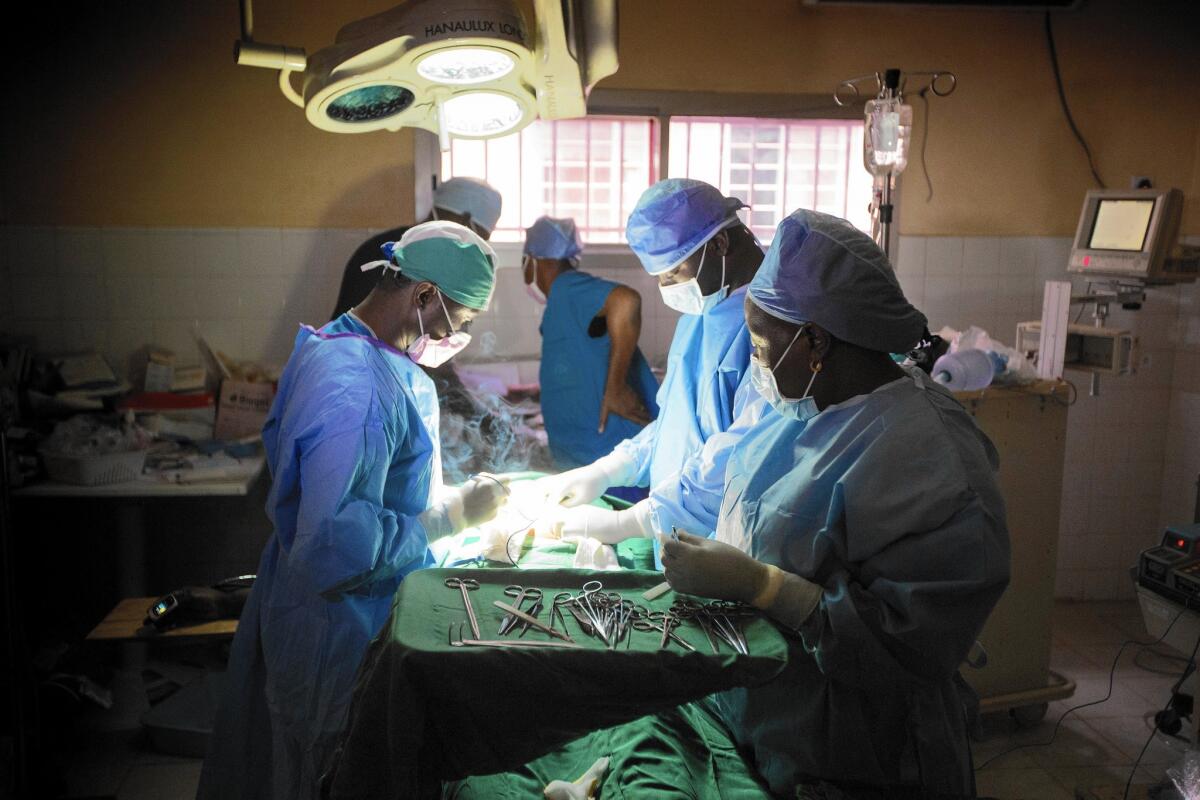Ebola patient who died had received ZMapp late in his treatment

- Share via
A frantic, 36-hour effort to save the life of Dr. Martin Salia at the Nebraska Medical Center included a rare dose of the experimental Ebola drug ZMapp, hospital officials disclosed Monday.
The 44-year-old surgeon contracted the virus while treating patients in Sierra Leone and arrived in Omaha on Saturday in “extremely critical condition,” doctors there said. Salia succumbed to the disease at 4 a.m. Monday.
ZMapp was one of two unproven medical treatments healthcare workers employed during a round-the-clock struggle to save him, officials said. The second was a transfusion of blood plasma from an unnamed Ebola survivor.
Both treatments failed to reverse the course of Salia’s illness.
“When he arrived ... he had no kidney function,” said Dr. Daniel Johnson, the hospital’s critical care director. “He was working extremely hard to breathe and was unresponsive.”
Salia began constant kidney dialysis shortly after being admitted, and was intubated and placed on a ventilator within 12 hours, Johnson said. When his blood pressure began to plummet, medical staff struggled to maintain it.
“Despite amazing care ... he progressed to the point of cardiac arrest,” Johnson told reporters. “We really gave it everything we could.”
Neither ZMapp nor the transfusion of so-called convalescent plasma has been proven to fight Ebola in humans. However, researchers believe they might help by introducing useful virus-fighting antibodies into a patient’s bloodstream.
The hospital, which has successfully treated two other Ebola patients, was contacted by ZMapp’s sponsor after learning that Salia was being flown there for treatment, according to Dr. Christopher Kratochvil, vice chancellor for clinical research at the University of Nebraska Medical Center.
“They reached out to us and said some product was available,” Kratochvil said.
ZMapp was developed by Mapp Biopharmaceutical Inc. in San Diego, and contains a cocktail of three monoclonal antibodies. The drug is grown in tobacco leaves and takes months to develop. In August, the company announced that its supply had been exhausted.
Monday was the first time since then that officials had discussed its use in a patient.
ZMapp is known to have been used in seven patients, and four of those have recovered. That performance, along with promising clinical trial results in animals, prompted the U.S. Department of Health and Human Services Biomedical Advanced Research and Development Authority to initiate efforts to accelerate production of the drug.
“The first doses are undergoing testing and are expected to be available for clinical trial in January,” BARDA Director Robin Robinson said in an email Monday. “In addition, the company is working with Kentucky BioProcessing to produce additional doses that would be available later next year.”
Three doses of ZMapp are required for a single treatment course.
Robinson said that several clinical studies were slated to begin in January 2015, and that enough of the drug would be produced “to treat 20 to 40 persons” in each study.
Officials at Mapp Biopharmaceutical and Kentucky BioProcessing declined to respond to questions from The Times on Monday.
Erica Ollmann Saphire, a researcher at the Scripps Research Institute in La Jolla, said that she and other scientists were studying ways of improving ZMapp and streamlining its production.
In a paper published Monday in the journal PNAS, Saphire and her colleagues reported that two of the monoclonal antibodies in ZMapp attached themselves to the same structure on the surface of the Ebola virus.
This raised the possibility that they were redundant, Saphire said. If so, there may be ways to make the drug more quickly.
“If they bind in the same spot, and it turns out one of them works better, we could make more of that one,” she said.
It is not clear whether Salia received a full dose of ZMapp. But even if he did, its failure to save him doesn’t mean the drug is useless.
The surgeon had been infected for almost two weeks before he was given the drug. An initial blood test for Ebola produced what turned out to be a false negative result.
The delay in treatment could have contributed to Salia’s death.
“You just don’t know,” Saphire said. “If you want to know whether something works, you need to do a well-controlled laboratory study.”
Twitter: @montemorin






